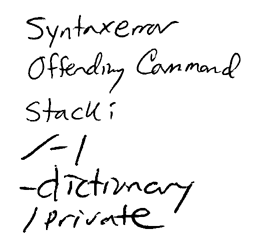 Submitting
raw PostScript to a print shop
Submitting
raw PostScript to a print shop Submitting
raw PostScript to a print shop
Submitting
raw PostScript to a print shopIf you want to have files printed by a commercial printer, it is a good idea to submit raw PostScript files instead of application (Quark, PageMaker, or FrameMaker) files.
Print shops have a dilemma with accepting raw PostScript: If a PostScript job prints, it is virtually guaranteed that it will print in exact conformance with the user's expectations when the file was created. But if the user makes a mistake in the creation of the file that causes a PostScript error upon interpretation - if the user forgets to include a font, say - it is next to impossible for the print shop to repair the error in the PostScript file!
The incidence of PostScript errors can be minimized by the print shop if it has access to the customer's application files. However, submission of application files to the print shop has the problem that a whole set of files must be submitted: You must submit not only your Quark or PageMaker document, but also all of its referenced graphics files. Submitting an application file also requires that the print shop is licensed for, and has installed, that application! Virtually all print shops have Quark and PageMaker, but they do not have some of the more specialized applications such as FrameMaker.
High-end print shops are generally happy to accept raw PostScript if you are willing to provide it, because it alleviates them of the need to deal with PostScript errors. But they might be hesitant if they consider you to be inexperienced with PostScript: They don't want to waste RIP time on failed PostScript jobs, and they don't want to waste technicians' time explaining things to you. The solution is to deliver your first PostScript job error-free!
Unfortunately, many imagesetters produce poor error messages, or none at all. Here is an actual error message that I received upon running a DocuTech job at Kinko's:

Try debugging from THAT! Not even a page number is provided! If you take care in preparing your job, you can prevent nightmares like this.
Adobe is moving rapidly to establish Acrobat PDF as the format of choice for electronic submission of print jobs. PDF has the advantage of being very robust concerning fonts, and enables use of just one file for each complete job. The Acrobat Reader is freely and widely available. However, not all print shops are familiar with Acrobat, and there are one or two potential kinks in the process.
You might be interested in the companion document Preparing to RIP.
Charles - Introduction to RIPping
1998-01-18